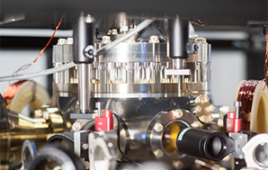 FRANKFURT, Germany — ISC Events, the organizer of the inaugural ISC Cloud & Big Data conference has announced Professor Peter V. Coveney of University College London (UCL) as the conference keynoter. Coveney will be talking about the current state-of-the-art in the development of personalized medicine on September 30, 2015.
FRANKFURT, Germany — ISC Events, the organizer of the inaugural ISC Cloud & Big Data conference has announced Professor Peter V. Coveney of University College London (UCL) as the conference keynoter. Coveney will be talking about the current state-of-the-art in the development of personalized medicine on September 30, 2015.
In a presentation titled “The Virtual Human: In Silico Methods for Personalised Medicine,” Coveney will talk about the opportunities and challenges involved in developing personalized medical treatment for patients. Currently one of the major challenges posed is the ability to analyze a substantial amount of patient data and to use it for predictive modeling. The goal is to deliver therapies and to enhance clinical decision making, on time scales which are far shorter than those usually considered in the context associated with academic research and development activities.
He will provide a couple of examples which illustrate the current state of the art. One addresses clinical decision support in the context of blood flow within neurovascular pathologies; the other is concerned with patient-specific drug discovery and treatment. He will also discuss the underlying infrastructure requirements, including data, compute and networks, and reflect on the potential for cloud and other approaches to meet future needs.
Peter V. Coveney holds a chair in Physical Chemistry, is an Honorary Professor in Computer Science at University College London (UCL), and is Professor Adjunct at Yale University School of Medicine (USA). He is also the Director of the Centre for Computational Science (CCS) at UCL and Chair of the UK Collaborative Computational Projects Steering Panel. Coveney is active in a broad area of interdisciplinary research including condensed matter physics and chemistry, materials science, as well as life and medical sciences in all of which data-intensive high performance computing plays a major role. He has published more than 350 scientific papers and co-authored two best-selling books: The Arrow of Time and Frontiers of Complexity, both with Roger Highfield. He is lead author of the first textbook on Computational Biomedicine (Oxford University Press, 2014).
Apart from Professor Coveney, over 40 cloud computing and big data experts will be addressing the latest and highly relevant topics in the workshops, business, technology and research tracks on September 28 to 30.
ISC Cloud & Big Data Workshops
This year, for the very first time, attendees will have access to eight very interesting workshops. The agenda app specifies the target audience of each workshop, to help attendees pick those highly relevant to them.
Some of the most compelling ones are
- “Using GPUs for Deep Learning – A Hands-On Introduction to Deep Learning for Accelerating Deep Learning on a GPU Cluster”
- “Securing HPC in the Cloud,” “HPC Cloud Solutions for Manufacturing,” “Working in a Fairytale Country – Towards Becoming a Data Scientist”
- “Large Scale Data Analytics with Amazon Web Services”
- and the relatively new topic of “Docker Containers for Scientific & Engineering Applications – A New Era of Packaging, Delivering & Accessing Complex Software”
Docker is an open platform for building, shipping and running distributed applications. It gives programmers, development teams and operations’ engineers the common toolbox they need to take advantage of the distributed and networked nature of modern applications. Since its inception in mid-2013, the Docker software has been downloaded almost 100 million times.
Early-bird registration ends August 19.
About ISC Cloud & Big Data
This new format offers attendees two full days of multi-track sessions, highlighting current and future technologies, and applications most relevant in the cloud and big data fields. The conference will be bringing together 250 attendees from across the community to learn and discuss their experiences. They will span the spectrum of cloud and big data users, coming from industries including manufacturing, medical and pharmaceutical, financial services, retail, and the energy sector, as well as from government agencies and research organizations.



